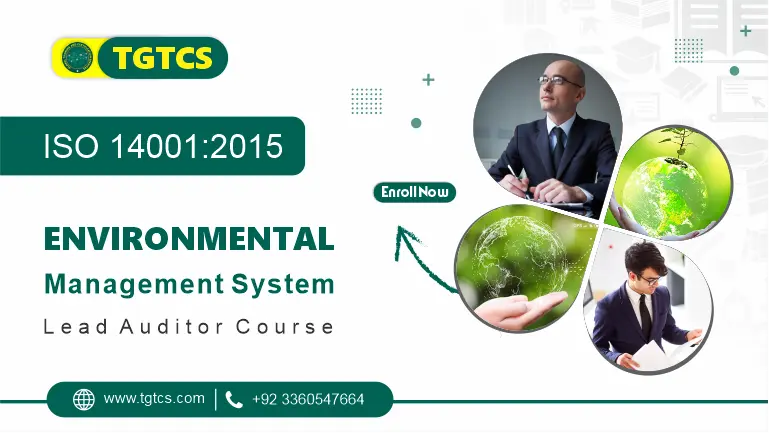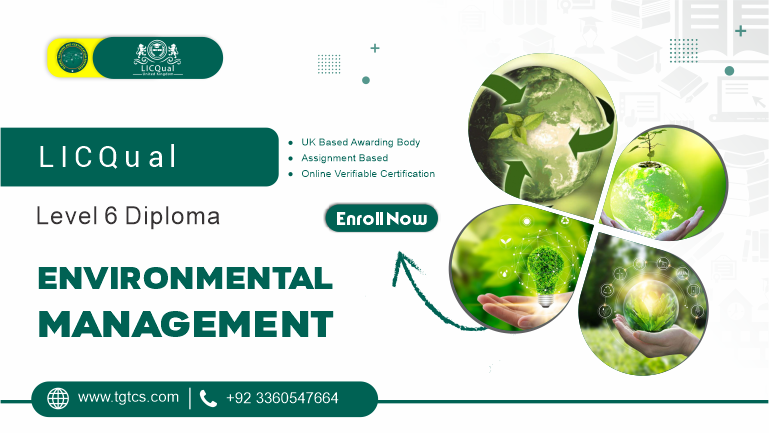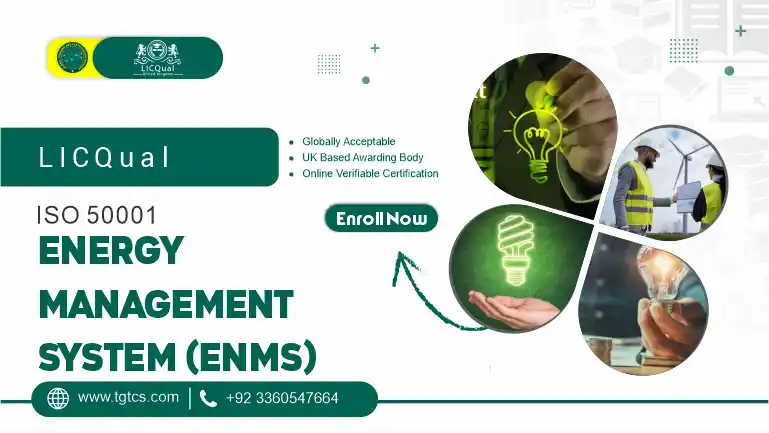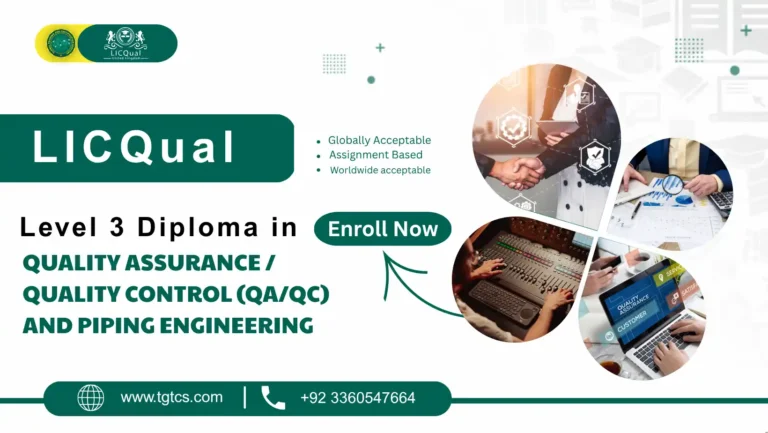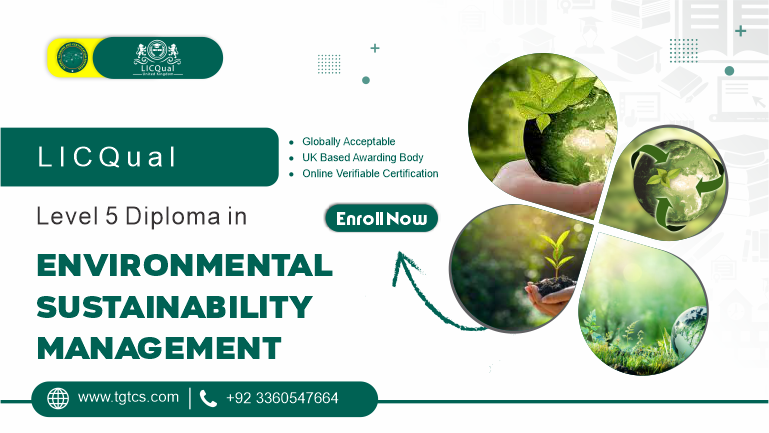ISO 14001:2015 Environmental Management System (EMS) Lead Auditor Course
Elevate Your Career with the ISO 14001:2015 Environmental Management System (EMS) Lead Auditor Course!
The ISO 14001:2015 Lead Auditor Course is a professional and comprehensive programme designed for individuals seeking to excel in environmental management and auditing. This EMS Lead Auditor Training equips participants with the skills and knowledge to lead ISO 14001 Environmental Management System audits effectively, ensuring organizations achieve compliance with environmental regulations and enhance sustainability performance.
Ideal for environmental professionals, auditors, and managers, this course covers the principles, framework, and requirements of ISO 14001:2015 EMS Certification Course, including risk-based thinking, environmental impact assessment, and continual improvement strategies. Participants will gain practical experience in planning, conducting, reporting, and following up on audits, making them fully capable of evaluating organizational compliance and recommending corrective actions.
Delivered by industry experts, this ISO 14001 Lead Auditor Certification programme is highly interactive, combining theoretical instruction with real-world case studies, group exercises, and practical audit scenarios. By the end of the course, learners will develop essential auditing skills, including report writing, stakeholder communication, and corrective action planning, while mastering the standards of the Environmental Management System Lead Auditor Course.
Successful participants receive a globally recognized ISO 14001 EMS Lead Auditor Certification, enhancing career opportunities in environmental consultancy, corporate sustainability, compliance management, and governmental or regulatory roles. This course is also ideal for organizations aiming to implement or improve their ISO 14001 EMS Certification Course and achieve environmental excellence.
Advance your career with the ISO 14001:2015 Environmental Management System Lead Auditor Course and become a certified professional capable of driving sustainable business practices and ensuring regulatory compliance worldwide.
Ready to revolutionize your business? Contact us today to embark on your journey to ISO 14001:2015 certification and redefine the future of your organization.
The ISO 14001:2015 Environmental Management System (EMS) Lead Auditor Course is a training program designed to provide individuals with the knowledge and skills necessary to effectively audit environmental management systems based on the ISO 14001:2015 standard. ISO 14001 is an international standard that specifies requirements for an effective environmental management system, providing a framework for organizations to identify and control their environmental impact.
The Lead Auditor Course is typically structured to meet the requirements set by international accreditation bodies and organizations that recognize the competence of auditors. The course content is aligned with the ISO 14001:2015 standard and covers various aspects related to environmental management systems and auditing practices.
Key components of the course may include:
- ISO 14001:2015 Overview: An in-depth understanding of the ISO 14001 standard, its structure, and the requirements for an effective environmental management system.
- Auditing Principles and Practices: Training on auditing principles, techniques, and best practices. This includes understanding the audit process, audit planning, conducting audits, and reporting findings.
- Roles and Responsibilities of a Lead Auditor: Clarification of the specific roles and responsibilities of a lead auditor within the context of environmental management system audits.
- Risk-Based Thinking: Understanding the concept of risk-based thinking as it applies to environmental management and how it should be integrated into the audit process.
- Documentation and Record Keeping: Guidance on the documentation and record-keeping requirements associated with ISO 14001, and how auditors should assess compliance.
- Communication and Interviewing Skills: Training on effective communication and interviewing techniques, as auditors need to interact with personnel at all levels during the audit process.
- Audit Reporting: Instruction on how to compile and communicate audit findings and recommendations in a clear and concise manner.
- Corrective Action and Follow-Up: Understanding the process of identifying non-conformities, recommending corrective actions, and verifying the effectiveness of corrective actions taken by the audited organization.
Successful completion of the ISO 14001:2015 Environmental Management System Lead Auditor Course often leads to certification as a lead auditor. This certification is recognized internationally and signifies that the individual has the competence to plan, conduct, and manage environmental management system audits in accordance with ISO 14001:2015.
Course Benefits of ISO 14001:2015 Environmental Management System (EMS) Lead Auditor Course are as follow:
1. Gain In-Depth Knowledge of ISO 14001:2015 EMS
- Understand the structure, principles, and requirements of the ISO 14001:2015 standard.
- Learn how to integrate EMS into organisational processes.
- Comprehend risk-based thinking and continual improvement concepts.
- Identify environmental aspects, impacts, and compliance requirements.
- Develop the ability to align EMS with organisational goals.
2. Develop Professional EMS Auditing Skills
- Learn to plan, conduct, and report EMS audits effectively.
- Master auditing techniques, checklists, and evidence gathering.
- Identify non-conformities and recommend corrective actions.
- Ensure objective evaluation of organisational compliance.
- Enhance your credibility as a certified EMS auditor.
3. Enhance Career Opportunities
- Boost employability in environmental consultancy, sustainability, and compliance roles.
- Qualify for positions such as EMS Lead Auditor, Environmental Manager, or Compliance Officer.
- Increase potential for promotion within current roles.
- Gain global recognition for ISO 14001 expertise.
- Stand out in competitive job markets.
4. Acquire Leadership Skills for Auditing Teams
- Learn to lead audit teams professionally and efficiently.
- Assign responsibilities according to team expertise.
- Motivate team members and maintain collaboration.
- Manage conflicts and ensure ethical auditing practices.
- Improve team performance and audit effectiveness.
5. Practical Experience Through Case Studies and Exercises
- Apply ISO 14001 principles in real-world audit scenarios.
- Analyse environmental risks and compliance gaps.
- Develop problem-solving and decision-making skills.
- Simulate audit reporting and corrective action planning.
- Build confidence in practical EMS auditing situations.
6. Improve Organisational Environmental Performance
- Learn to evaluate processes for sustainability and compliance.
- Identify opportunities for reducing environmental impact.
- Support organisations in achieving regulatory compliance.
- Promote resource efficiency and waste management.
- Contribute to organisational continuous improvement.
7. Strengthen Communication and Reporting Skills
- Develop clear and concise audit report writing skills.
- Learn to communicate findings effectively to management.
- Gain skills to explain complex EMS requirements to stakeholders.
- Present recommendations in a professional manner.
- Enhance collaboration with cross-functional teams.
8. Prepare for ISO 14001 Lead Auditor Certification
- Understand the certification process and examination requirements.
- Review key audit principles and ISO 14001 clauses.
- Gain confidence to successfully pass the lead auditor exam.
- Ensure professional recognition as an ISO 14001 Lead Auditor.
- Boost credibility for career advancement and consultancy roles.
9. Support Career in Environmental Compliance and Sustainability
- Become capable of implementing and auditing EMS across industries.
- Advise organisations on environmental strategies and compliance.
- Contribute to corporate social responsibility initiatives.
- Align business operations with international environmental standards.
- Drive sustainability and regulatory excellence in your organisation.
10. Achieve Personal and Professional Growth
- Enhance critical thinking and analytical skills.
- Improve problem-solving and decision-making in environmental management.
- Build confidence in handling complex EMS audits.
- Gain expertise valued globally in environmental management.
- Position yourself as a knowledgeable and skilled EMS professional.
Learning outcomes for an ISO 14001:2015 Environmental Management System (EMS) Lead Auditor Course are as follow :
1. Introduction to Environmental Management Systems
- Understand the concept, purpose, and benefits of an Environmental Management System (EMS) within organisations.
- Explain the ISO 14001:2015 standard and its relevance to global environmental compliance.
- Identify the key components and structure of an EMS, including policy, objectives, and continual improvement.
- Recognise the role of environmental management in sustainable business practices.
- Evaluate the impact of environmental legislation and regulations on organisational operations.
- Analyse the relationship between EMS and other management systems, such as ISO 9001 and OHSAS 45001.
2. Environmental Management Principles
- Understand the principles of environmental protection and sustainability in organisational contexts.
- Explain environmental aspects and impacts and how they affect business operations.
- Apply the concept of risk-based thinking to environmental management decisions.
- Demonstrate knowledge of pollution prevention, resource efficiency, and waste management.
- Develop skills to assess compliance with environmental laws and regulations.
- Integrate environmental management principles into organisational strategic planning.
3. Auditing Principles and Techniques
- Understand the purpose, benefits, and types of audits within an EMS framework.
- Explain the principles of auditing including independence, evidence-based approach, and confidentiality.
- Develop skills in identifying non-conformities and opportunities for improvement.
- Apply techniques for gathering and verifying audit evidence.
- Recognise the roles and responsibilities of auditors and auditees.
- Evaluate audit findings objectively to support compliance and continual improvement.
4. Planning an Audit
- Develop an audit plan aligned with ISO 14001:2015 requirements.
- Identify audit scope, objectives, and criteria for effective EMS audits.
- Prepare checklists and audit tools for structured evaluation.
- Analyse organisational processes to determine key audit areas and risks.
- Schedule and allocate resources efficiently for audit activities.
- Communicate the audit plan effectively to relevant stakeholders.
5. Conducting an Audit
- Conduct on-site audit activities using professional auditing techniques.
- Observe and verify compliance with EMS policies, objectives, and ISO 14001 requirements.
- Interview staff and assess operational processes for environmental performance.
- Identify non-conformities and gather evidence for audit reporting.
- Apply communication skills to engage auditees and maintain professional relationships.
- Demonstrate ethical auditing practices while ensuring objectivity and impartiality.
6. Reporting and Following up on an Audit
- Compile audit findings into a clear, accurate, and professional audit report.
- Classify non-conformities according to severity and compliance requirements.
- Recommend corrective actions to address identified gaps.
- Follow up on the implementation of corrective and preventive measures.
- Communicate results effectively to management and relevant stakeholders.
- Ensure continuous improvement through audit feedback and lessons learned.
7. Leading an Audit Team
- Develop leadership skills for managing and coordinating audit teams.
- Allocate tasks and responsibilities according to team members’ expertise.
- Motivate team members to maintain objectivity, professionalism, and efficiency.
- Resolve conflicts and ensure effective collaboration during audits.
- Monitor audit progress and maintain compliance with ISO 14001 requirements.
- Evaluate team performance and provide constructive feedback for improvement.
8. Exam Preparation and Certification
- Understand the structure, format, and requirements of the ISO 14001:2015 Lead Auditor examination.
- Review key EMS concepts, auditing principles, and ISO 14001 clauses.
- Apply practical audit scenarios to test knowledge and skills.
- Develop effective time management strategies for exam success.
- Demonstrate readiness to perform as a certified ISO 14001 EMS Lead Auditor.
- Gain confidence in achieving professional certification and enhancing career prospects.
The ideal learner for the ISO 14001:2015 Environmental Management System (EMS) Lead Auditor Course possesses a unique combination of knowledge, skills, and attributes that align with the requirements of auditing environmental management systemspossesses the following attractive qualities:
- Environmental Awareness:
- Demonstrates a strong understanding of environmental issues and sustainability principles.
- Recognizes the importance of environmental management in organizations and the broader community.
- Educational Background:
- Holds a relevant academic background in environmental science, engineering, management, or a related field.
- Has a solid foundation in environmental regulations, compliance, and best practices.
- Audit Experience:
- Brings prior experience in auditing or quality management systems, preferably with exposure to environmental management systems.
- Understands the audit process and the principles of conducting effective and thorough audits.
- Communication Skills:
- Possesses excellent verbal and written communication skills to articulate audit findings clearly and professionally.
- Can engage effectively with a diverse range of stakeholders, including management and operational staff.
- Analytical Thinking:
- Demonstrates strong analytical skills to assess and evaluate complex environmental management processes.
- Capable of identifying potential areas of improvement and recommending corrective actions.
- Regulatory Knowledge:
- Stays updated on local and international environmental regulations relevant to the industry.
- Understands the legal requirements and compliance obligations related to environmental management.
- Attention to Detail:
- Pays meticulous attention to detail when reviewing documents, processes, and procedures during the audit.
- Ensures accuracy in the assessment of environmental management system elements.
- Ethical Conduct:
- Adheres to high ethical standards and professional conduct throughout the auditing process.
- Values integrity and transparency in reporting audit findings.
- Team Collaboration:
- Works well in a team environment, collaborating with other auditors and stakeholders.
- Open to sharing knowledge and learning from peers during the course.
- Continuous Improvement Mindset:
- Embraces a commitment to continuous learning and improvement in environmental management practices.
- Seeks opportunities to enhance personal and professional development.
- Problem-Solving Skills:
- Possesses strong problem-solving capabilities to address challenges encountered during the auditing process.
- Can think critically and propose effective solutions to enhance environmental performance.
- Adaptability:
- Demonstrates flexibility and adaptability to navigate various industries and organizational structures.
- Can apply auditing principles in diverse settings.
By embodying these qualities, the ideal learner for the ISO 14001:2015 EMS Lead Auditor Course is well-equipped to excel in auditing environmental management systems and contributing to the improvement of sustainable business practices.
Mandatory Unit
- Introduction to Environmental Management Systems
- Environmental Management Principles
- Auditing Principles and Techniques
- Planning an Audit
- Conducting an Audit
- Reporting and Following up on an Audit
- Leading an Audit Team
- Exam Preparation and Certification
Course Overview
Duration
5 Days Online Training
Awarding Body
LICQual
ACS-GP
IPQI
CQI-IRCA
